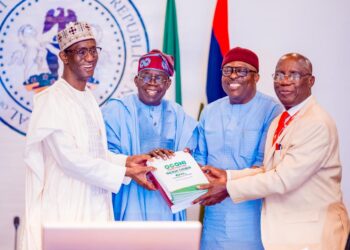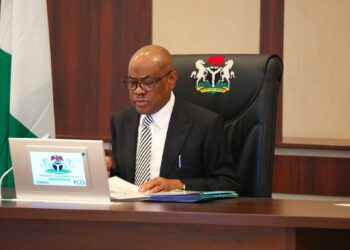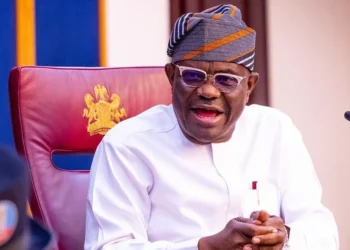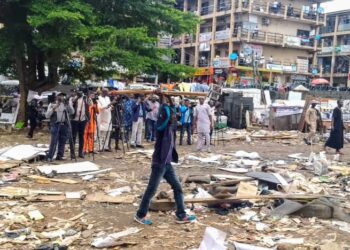President Bola Ahmed Tinubu convened a closed-door meeting with key stakeholders from Rivers State, including Governor Siminalayi Fubara, former Governor Nyesom Wike, and representatives of Ogoni leaders, to address pressing issues surrounding the Niger Delta cleanup project and escalating political tensions in the state.
The meeting was confirmed by Dada Olusegun, the Special Assistant to the President on New Media, in a post on X (formerly Twitter).
It was attended by key government figures, including Chief of Staff to the President, Femi Gbajabiamila; National Security Adviser, Nuhu Ribadu; Group Chief Executive Officer of the Nigerian National Petroleum Company Limited (NNPCL), Mele Kyari; Minister of Information and National Orientation, Mohammed Idris; and other senior officials.
The meeting comes against the backdrop of demands by a coalition of civil society organizations for a $1 trillion allocation from the Federal Government to address environmental damage and compensate for lost livelihoods in the Niger Delta. The coalition insisted that these actions precede the resumption of crude oil production in Ogoniland.
Back story
In a joint statement, the organizations—Environmental Rights Action/Friends of the Earth Nigeria, Corporate Accountability and Public Participation Africa (CAPPA), and Health of Mother Earth Foundation (HOMEF)—expressed alarm over the government’s plan to restart oil production in the region.
- They criticized the lack of community involvement and decried the move as a violation of environmental justice and the rights of the Ogoni people.
- The coalition also took issue with the invitation extended by National Security Adviser Nuhu Ribadu for a closed-door meeting with select Ogoni stakeholders in Abuja. The timing of the meeting, scheduled for January 21, 2025, raised concerns among activists about transparency and genuine stakeholder engagement.
The statement also referenced the 2011 UNEP report, which documented extensive environmental degradation in Ogoniland caused by oil activities, including widespread pollution of land, water, and air.
Political Tensions in Rivers State Take Center Stage
The meeting occurred amid a deepening political feud in Rivers State between Governor Siminalayi Fubara and his predecessor, Nyesom Wike. Once political allies, the two have been locked in a bitter power struggle since Wike assumed his ministerial role in Tinubu’s cabinet.
- The rift has left Rivers State embroiled in political chaos, with the state House of Assembly becoming a battleground. In the past three months, 27 lawmakers defected from the opposition Peoples Democratic Party (PDP) to the ruling All Progressives Congress (APC), aligning with Wike.
- This shift has fueled tensions, resulting in parallel legislative sessions, an impeachment attempt against Governor Fubara, the controversial demolition of the Assembly complex, and the resignation of key commissioners loyal to Wike.
Efforts by President Tinubu and elder statesmen to mediate the conflict earlier in October temporarily de-escalated tensions but failed to achieve lasting peace. The fallout has further complicated governance in the oil-rich state and cast a shadow over the federal government’s plans for Ogoniland.
What This Means for the Niger Delta
The Niger Delta cleanup and restoration remain contentious issues for successive administrations. The $1 trillion demand shows the scale of environmental degradation in the region, which has suffered decades of oil spills and exploitation.
- While the Federal Government has initiated efforts like the Hydrocarbon Pollution Remediation Project (HYPREP), critics argue that progress has been slow and marred by bureaucratic inefficiencies.
- Observers say the meeting could signal a renewed commitment to addressing the Ogoni cleanup, but the unresolved political crisis in Rivers State may hamper progress.
Environmental advocates are urging the government to prioritize justice for affected communities, ensure transparency in negotiations, and include a broader range of stakeholders in decision-making processes.
























